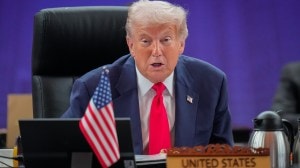Behold the real Jinnah
Described by one of his leading biographers, Stanley Wolpert, as “disjointed ramblings”, Mohammad Ali Jinnah’s speech at the ...

Described by one of his leading biographers, Stanley Wolpert, as “disjointed ramblings”, Mohammad Ali Jinnah’s speech at the inaugural session of the Constituent Assembly of Pakistan continues to kindle debate even though the storm that almost claimed L.K. Advani has blown over. “What was he talking about? Had he simply forgotten where he was? Had the cyclone of events so disoriented him that he was arguing the opposition’s brief?” asks Wolpert (Jinnah of Pakistan, 1984).
Just three days later, on August 14, 1947, the Quaid-e-Azam was back to his organised “cold and remote” self, as Mountbatten’s Press Attache Allan Campbell-Johnson — then in Karachi along with the Mountbattens — recounts. “He makes only the most superficial attempt to disguise himself as a constitutional Governor-General, and one of his first acts after putting his name forward was to apply for powers under the 9th Schedule rather than Part II of the 1935 Act which gave him at once dictatorial powers unknown to any constitutional Governor-General representing the King. Here indeed is Pakistan’s King Emperor, Archbishop of Canterbury, Speaker and Prime Minister concentrated into one formidable Quaid-e-Azam.” (Mission with Mountbatten, 1951). Pushed unceremoniously off the political stage by Gandhi’s non-cooperation movement in 1920, and unable to regain a stable foothold till the late 1930s when he finally switched over from ‘liberal communalism’ to extreme communal politics, Jinnah — the creator of Pakistan — has only himself to blame for the demonisation of his public persona.
For few individuals in history have applied themselves with such single-mindedness of purpose as Jinnah did to accomplish a goal so unnatural within so brief a span of time.
Pre-1937, writes Sir Penderel Moon, correctly identifying the inverse nexus, Gandhi’s rise to ascendancy in the Congress was more or less coincident with Jinnah’s estrangement from it (Divide and Quit, 1961). Post-1937, Jinnah’s virulently passionate and unbending espousal of the two-nation theory became a dramatic counter-point to the Mahatma’s lifelong pursuit of Hindu-Muslim unity as the essential basis of Indian independence.
Replying to a letter from a certain Sarfaraz Husain of Nainital, Swami Vivekananda had written on June 10, 1898: “For our own motherland a junction of the two great systems, Hinduism and Islam — Vedanta brain and Islam body — is the only hope. I see in my mind’s eye the future perfect India rising out of this chaos and strife, glorious and invincible, with Vedanta brain and Islam body.” (The Complete Works of Swami Vivekananda, Vol 6).
For all the startling richness of this metaphor, Gandhi’s approach to the problem of Hindu-Muslim unity was at once deeper and more practical. From the Khilafat movement, his first major experiment in secular nationalist mobilisation (doubted by many at that time and even today), to his ‘rejection’ of Partition 27 years later as he battled communal savagery in Calcutta, setting himself up as a “One Man Boundary Force” — the Mahatma was convinced that there could be no abiding solution to India’s problems, and no genuine freedom either, other than on the basis of Hindu-Muslim unity. And he found it impossible to act otherwise, even in his death.
With great respect to Sarojini Naidu, only one man on the sub-continent fully deserved the honour of being called “the ambassador of Hindu-Muslim unity” and he was Gandhi, not Jinnah.
In the ‘pure’ doctrinal sense, of course, and beyond the sidelines of the freedom struggle, it was Savarkar — the mature ideologue and not the young revolutionary — who was, or should have been, Jinnah’s main foe.
In his notes of an half-hour-long meeting with Lord Linlithgow on January 12, 1940, K.M. Munshi recounts his telling the viceroy at the end: “If there is no alliance between nationalist India and Britain it may be that we may go, may be for a long time, but then V.D. Savarkar and Jinnah will fight it out.” (Pilgrimage to Freedom, 1967).
And yet, as B.R. Ambedkar pointed out, and strange though it might appear, Savarkar and Jinnah — instead of being opposed to each other — were “in complete agreement”: that there were two nations in India, one Muslim and the other Hindu. They differed only as regards the terms and conditions on which the two nations should live. Jinnah wanted India to be cut up into two while Savarkar wanted both to live in one country with the Hindus as the dominant nation and the Muslims as the servient one (Pakistan or the Partition of India, 1946). A partly critical, partly sympathetic, but on the whole a highly instructive analysis of the demand for Pakistan, Ambedkar’s book also contains a keen insight into Jinnah’s psyche and personality.
Jinnah, said Ambedkar, was “too self-opinionated, an egotist without the mask”, with a degree of arrogance “not compensated by any extraordinary intellect or equipment”. And, possibly for that reason, he was unable to reconcile himself to a second place and work with others in that capacity for a public cause even though he was neither a tool of the British nor a soldier of fortune”.
That Jinnah’s vanity and ambition had much to do with his choice of the path that he pursued in the late 1930s and ’40s, frustrating all efforts at compromise, cannot be denied. Next to the whole colonial policy of the British, it was the single most important factor contributing to the transformation of Pakistan from “an undergraduate squib” (in Lord Wavell’s words) into a sovereign state. The invective that he heaped upon Maulana Azad, calling him the “showboy” of the Congress, and his refusal even to shake hands with him, saw Jinnah plumbing the lowest depths of vulgarity in public behaviour. Part of a scarcely concealed strategy to establish himself as the sole spokesman of India’s Muslims, this cynical mix of pride, prejudice and politics was the real Jinnah. To search for any other is both irresponsible and futile.
The writer is counsel for the Liberhan Commission. The views expressed are his own






- 01
- 02
- 03
- 04
- 05

























